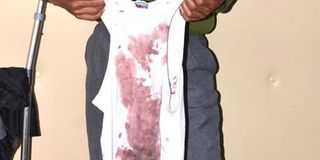Bullying has potential for life-long consequences

A Form One student at Alliance High School in Nairobi shows a bloodstained vest. Clothes were soaked in his blood when prefects beat him at the institution, he said. PHOTO | DUN SIKOYO | NATION MEDIA GROUP
What you need to know:
All education stakeholders must encourage honest discussion on bullying.
Pupils and students should be encouraged to openly talk about their challenges and expose bullies.
Instances of bullying should be dealt with promptly to discourage perpetuation of the culture.
“I hated myself and I have never recovered from it,” said John, sadness written all over his face. “I stopped bed-wetting at the age of four. Never once did I imagine that someone would accuse me of it.”
The doctor listened intently as John, now 21 years old, narrated the ordeal that had a great impact on his life. John was attending psychotherapy for generalised anxiety disorder and insomnia.
“So, what exactly happened?” The doctor asked.
“Joining a boarding school at Form One brought this wrenching feeling of loneliness. Two boys picked on me and made my life hell.”
One day, John said, one of the boys, “a big, moustachioed boy came to my cubicle and demanded that I ‘adopt’ him for one week”.
Adopting meant buying him bread every day for his mid-morning tea and washing his dirty shirts every evening. John politely declined. “Look at this mosquito threatening an elder!” the senior student exclaimed as his friend, a tall boy in Form Four, approached.
“If you continue this way, I will report you to the deputy principal,” John threatened.
“Adoption is a tradition in this school, and the deputy principal knows it,” said the senior student.
The following day, he avoided going for mid-morning tea. After afternoon classes, he found dirty shirts thrown on his bed and immediately knew whom they belonged to. He promptly put them on the beds of the owners.
'MY BED'
“I was awoken the following morning by jeers and catcalls as boys milled around my bed,” he said. When he asked what the problem was he was told he had wet his bed at night.
“I felt for my mattress. It was wet. My pants were wet but there was no smell of urine,” he said.
For the next one week, John woke up every morning to find a wet bed. He started doubting himself, and recoiled whenever the topic came up for discussion. What hurt him most was when the house captain singled him out for “dirtying the dormitory with urine” during a meeting which the house matron attended.
He feigned illness and went home. That was his last day in the school. He convinced his father to transfer him to a day school. He did not give reasons for his decision, but he threatened to drop out of school if he was forced to stay. Even after joining the other school, he battled nightmares, panic attacks and insomnia throughout high school. He did not know what caused them, until the therapist dug into his life.
The story of bullying in top secondary schools in the country brings to the fore a critical issue in the development of our adolescents. Immediately news surfaced of bullying at Alliance High School, social media was awash with hilarious, if not outrageous, methods of bullying in our schools.
While many joked about it, bullying is a serious issue with long-term.
In Erikson’s stages of human development, each stage is attended by a psychosocial crisis- which is either positive or negative. Erikson focused on the adolescent period, feeling it was a crucial stage in the development of a person’s identity.
PEER GROUP
The fourth stage of development, known as competence vs inferiority, focuses on 6-12 years of age. During this stage, the child’s peer group takes centre stage and becomes a major source of self-esteem. There’s great need for approval and a sense of pride in their accomplishments. If encouraged, children begin to feel industrious and confident in their abilities. Bullying curtails this and breeds self-doubt on one’s abilities.
The fifth stage is the most important for adolescents. It focuses on identity vs role confusion (12-18 years). This is a transitional period between the morality learned by the child and the ethics developed by the adult. Bullying can result in formation of a negatively inclined individual, who has difficulty relating with others.
Some victims of bullying may seek solace in drugs and substance abuse. Others descend into suicidal ideation, which in some cases leads to suicide.
All education stakeholders must encourage honest discussions on bullying. Pupils and students should be encouraged to openly discuss their challenges and expose bullies. Instances of bullying should be dealt with promptly to discourage perpetuation of the culture.
Paul Karau is a doctor and author. He is currently a resident in internal medicine at the University of Nairobi.




